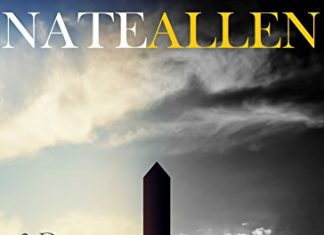The Counterfeit turned out to be a singularly fascinating read. The opening had me immediately hooked through its stream-of-consciousness narrative style depicting the inner thoughts of a man in a coma. The framing was artful and taut, with a fast-moving pace and clever use of minimalistic language. I immediately found the main character (narrating the story from the first-person) to be real and relatable. The backstory of his marital and self-image problems is spot-on in portraying the struggles of many people in the real world. There was also an immediate sense of suspense as we see him awaken in a “Paradise” realm that is stated to be neither Heaven nor Hell. He is told by others he meets there that this is the “real” afterlife as opposed to those other, “imaginary” places. But various clues begin to indicate that things are not quite what they seem… I read on with an intense curiosity as the mystery behind this strange place. What followed was a very intriguing scenario, suggesting the afterlife could have more levels of detail to it than we are inclined to think; highly speculative, yes, but clearly well thought out and perfectly compatible with Biblical orthodoxy.
the afterlife could have more levels of detail to it than we are inclined to think
There were some weak points, of course, many of which could have been addressed through a longer, more detailed narrative. The sequence of events seems a bit rushed and forced in places, with the protagonist’s actions and decisions not seeming to logically follow from one another – this cropped up several pages after his first entry into the “Paradise” realm. The dialogue started out strong but became progressively more wooden towards the middle and downright syrupy towards the end – for some reason, the characters seemed to be selectively avoiding contractions in their speech (i.e. “he is” as opposed to “he’s”, etc). This made things a bit awkward and stilted, and seemed out-of-place given the established characterization. I also noticed that protagonist became increasingly weepy and emotional as his character arc progressed – a lot of this made sense giving the story itself, but I often found myself cringing and wishing he would grow a spine.
The story structure itself turned out to be a bit different from what was suggested in the synopsis. I was expecting a steady build-up of suspense culminating in a “Twilight Zone”-style twist ending. The big “reveal” turned out instead to be at about the very middle of the narrative, but the author did a good job of providing another, equally significant source of tension until the very end.
Throughout the entire 66 pages, this novella is suffused with thought-provoking, highly spiritual themes that make it in many ways a masterwork of Christian Fiction in the tradition of C.S. Lewis. I was particularly fascinated by the portrayal of God as representing ‘fullness’ and the Devil representing ‘emptiness’ – it reminds of J.R.R. Tolkien’s thoughts on the ‘nothingness’ of evil. When imagining Hell, we often think that simple ‘non-existence’, ‘annihilation,’ or ‘oblivion,’ would be a preferable fate for lost souls – the truth, I think, is that Hell is all of these things. It represents complete and irrevocable separation from the very Source of existence. To experience nothingness is to experience torment beyond imagining – what Christ meant when he used imagery of a ‘lake of fire.’ The author explores this idea not through didactic lines placed in characters mouths, but by weaving it into the very fabric of the story. I will also continue to ponder his thoughts on maintaining a heavenly as opposed to earthly perspective when it comes to reaching the lost with the Truth.
i was particularly fascinated by the portrayal of god as representing ‘fullness’ and the devil representing ’emptiness’
At the same time, he features extremely vivid and well-imagined descriptions of what Heaven will likely be, masterfully portraying what many of us tend to think of as indescribable. Christ himself makes an appearance, and is portrayed in the same manner. I will say that I’m instinctively skeptical of attempts to ‘humanize’ God and Christ and put words in their mouth as story characters, and I might have preferred a more subtle or ‘poetic’ approach that recognizes their place above human understanding. But this is a minor quibble in comparison to everything else.
All in all, I give this book four stars and will readily recommend it to any Christian reader who wants to see their beliefs explored and re-confirmed in a new and original way. An excellent tour de force by an emerging author!
Content Ratings:
Heat: There were a few scenes of sexual innuendo. They were comparatively minor and not gratuitous, but the word pictures were just enough to make me uncomfortable. In retrospect, I see how their presence actually served the storyline, but it’s just something to be aware of for more sensitive readers.
Profanity: None.
Violence: Some frightening imagery and references to violent acts.
Genre: Christian Paranormal
Age recommendation: 15 and up, due to imagery and sexual innuendo.
Availability: This book is available in Kindle.
Disclaimer: I received a free copy of The Counterfeit with a request for an unbiased review.
Reviewed by A.K. Preston
A.K. Preston is the author of The Gevaudan Project, and has published short stories in The Unseen Anthology and The Untold Podcast (to be released sometime this year). You can find him at his website, AKPreston.com. In his spare time, he likes to read classic literature, history, and speculative fiction of all types.



 Forged Steel: An Underworld Mythos Novel – The Crucible, Book One – H.A. Titus
Forged Steel: An Underworld Mythos Novel – The Crucible, Book One – H.A. Titus
Leave a Reply